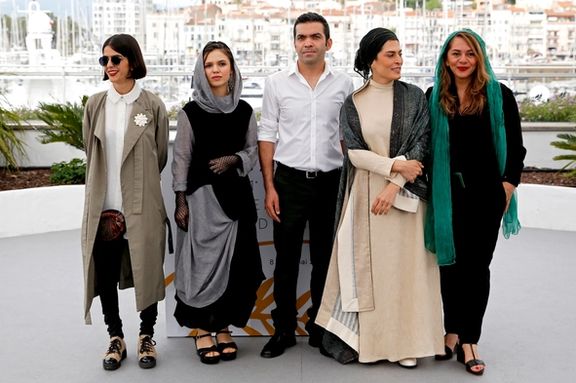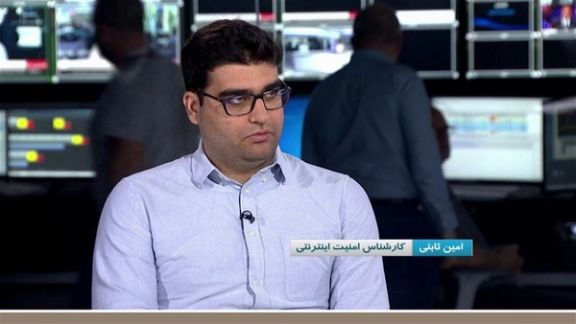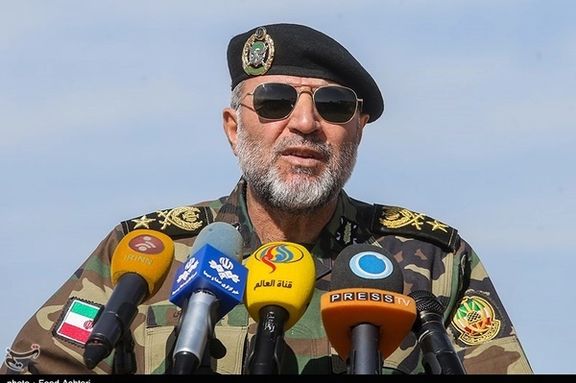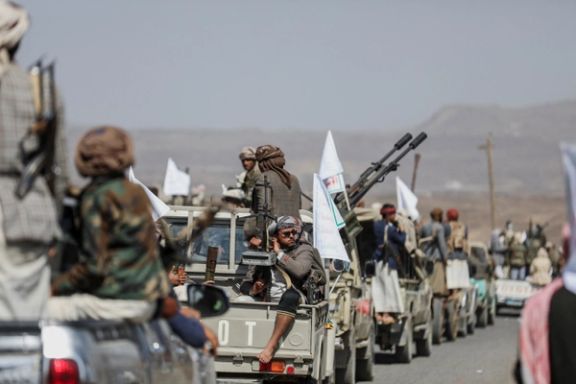Iranian Movies Should Get Permit To Appear In Foreign Festivals

Iran’s culture minister has said that Iranian movies should have a screening permit from the Islamic Republic’s authorities to be allowed to compete in foreign festivals.

Iran’s culture minister has said that Iranian movies should have a screening permit from the Islamic Republic’s authorities to be allowed to compete in foreign festivals.
Mohammad Mehdi Esmaili said Friday that the Ministry of Culture and Islamic Guidance will not exempt the movies bound for foreign screenings from its regulations.
Iranian movies, like music and books, are subject to draconian and lengthy review and censorship procedures by the Islamic government.
“We support any endeavor that contributes to the realization of the ideals of the Islamic Revolution, and there is no support for any production that seeks to be indifferent to the ideals of the Islamic Revolution,” he said. In an attempt to appear less authoritarian, he clarified, "This should not be construed as a crackdown on the intellectual sphere of the country."
Earlier in the week, Esmaili also said that promotion of music and musical works is not on the agenda of the Islamic Republic.
The culture minister also dismissed the notion that Iranians have become less religious over time, claiming that based on the latest survey conducted by the Ministry of Culture, Iran has demonstrated a significantly stronger adherence to religious norms this year compared to the pre-revolution era, when religious practice was free and not mandated by the ruling authority.
The Fajr Film Festival, once the Islamic Republic's most prominent annual cultural events, caused embarrassment for the regime this year. Iran's best-known filmmakers refused to attend the gala and critics criticized the organizers for their poor programming. The festival has become a political tool in the hands of hardliners to punish independent filmmakers and promote their loyalists.
Late in January, prominent Iranian filmmaker Asghar Farhadi said he will not produce any films in Iran until the ban on showing women without headscarves is lifted, as people demand.

Iran’s Hajj and Pilgrimage Organization announced the official cancellation of the Umrah pilgrimage, with refunds for over 30,000 Iranians already registered being processed.
The Umrah, an Islamic pilgrimage to the holiest Muslim city Mecca in Saudi Arabia, can be undertaken at any time of the year, in contrast to the Haj pilgrimage, which has specific dates according to the Islamic lunar calendar. The first group of Iranian pilgrims was scheduled to embark on Umrah in early January after about seven years of diplomatic estrangement between Tehran and Riyadh.
The cancellation of the Umrah pilgrimage was attributed to a "technical disagreement" regarding Iranian flight permits for entry into Saudi Arabia.
Hesam Ghorbanali, the spokesperson for Iran’s flag carrier airline Iran Air (Homa), said at the time that due to the lack of the required permit, the aircraft of the Islamic Republic was unable to travel to Saudi Arabia, claiming that the problem would be resolved within a few days.
Now after about a month and a half, Haj and Pilgrimage Organization announced that all registration fees will be refunded.
Since the suspension of Umrah in 2015 and the emergence of disagreements between Tehran and Riyadh, approximately six million Iranians have been awaiting the resumption of Umrah. The minister of culture had previously promised that before the summer of 2024, around 400,000 people would undertake the Umrah pilgrimage.
The relations between the Islamic Republic and Saudi Arabia have been strained over the years, with heightened tensions due to Iran's support for Shia paramilitary groups, notably in Yemen.
However, after a seven-year diplomatic hiatus, Tehran and Riyadh reached an agreement in February 2023 of the previous year to resume diplomatic relations. The agreement, mediated by China paved the way for a subsequent trip by Ebrahim Raisi, the President of the Islamic Republic, to Saudi Arabia.

A cybersecurity specialist asserts that the Iranian regime will continue facing increasing cyberattacks due to “structural defects” in their cyber defense systems.
Amin Sabeti told Iran International that digital security cannot rely solely on slogans and rhetoric, predicting further large-scale cyberattacks against Iranian targets.
The latest episode in a long series of cyberattacks in the past few years, was a major of hack of parliament’s servers that brought to light troves of documents, including the real income of lawmakers and US sanctions evasions.
He further stated that many projects aimed at developing what the regime terms “domestic services” have failed due to their reliance on corrupt connections and nepotism rather than meritocracy and expertise.
According to Sabeti, both public and private organizations in Iran do not take information security audits seriously. He emphasized that severing ties with the global internet cannot guarantee cybersecurity, highlighting the inefficacy of the regime’s costly “national internet” project.

Meanwhile, an Iranian lawmaker acknowledged the country's vulnerability to cyberattacks due to structural weaknesses in its cyberspace control. Shahriar Heydari, deputy chairman of the National Security and Foreign Policy Commission of the Iranian parliament, stated that the National Organization for Passive Defense and the Intelligence Ministry should be held accountable for recent cyberattacks against Iran.
“Cyberspace is a war of information. Every country needs to secure its systems against hacking and data theft,” Heydari stressed.
His remarks came two days after a cyberattack targeted over 600 Iranian government servers, including the Khaneh Mellat News Agency, the Iranian parliament’s media arm. Hacktivist group Uprising till Overthrow, closely linked with the Albania-based opposition Mujahideen-e Khalq (MEK) organization, claimed responsibility for the attack.
Heydari accused MEK of attempting to defame the Iranian parliament ahead of the upcoming parliamentary and Assembly of Experts elections on March 1. Documents leaked following the hack uncovered a wide range of Tehran’s strategies to circumvent US sanctions. The documents revealed the parliament's coordination with designated Iranian entities and individuals to facilitate their trade activities and conceal their identities and connections from international regulatory bodies.
Some other documents were also released by a group calling itself ‘Uprising till Overthrow’, including those related to the high salaries of Iranian lawmakers. Lawmakers have incomes that are at least 20 times more than what an ordinary government employee earns.
In December, a cyberattack paralyzed gas stations across Iran. The hacking group ‘Gonjeshk-e-Darande’ or Predatory Sparrow announced the attack on X, claiming that they took out “a majority of the gas pumps throughout Iran.” Tehran accuses the group of having links to Israel.
According to Heydari, the head of Iran’sPassive Defense Organization was invited to a session of the parliament’s National Security Commission following the December cyberattack.
“Instead of being accountable, he just justified and described the incident. Our problem is that if we invite an organization, the first thing they do is to justify and provide performance statistics, instead of discussing the main issue,” the lawmaker added.
However, the Iranian regime has been involved in sustained cyber operations against different targets around the world, to gain information or disrupt government operations and private companies.
Microsoft disclosed on Wednesday that state-backed hackers from Iran, Russia and China have been leveraging tools developed by Microsoft-backed OpenAI to enhance their cyber espionage capabilities.
Earlier in November, Microsoft’s Threat Analysis Center (MTAC) reported that Iran has intensified its cyberattacks and influence operations since 2020, targeting Israel and other countries. The report also warned that Iran, Russia and China are likely to plan to influence the upcoming elections in the United States and other countries in 2024.
In December 2023, Iran-linked hackers targeted a water facility in the rural area of County Mayo in Ireland, leaving the residents without water for two days. The attack was carried out by pro-Iran Cyber Av3ngers group which claimed that the facility was attacked because it used an Israeli-made piece of equipment.
Iran International revealed last month that Iran’s Intelligence Ministry conductscyberattacks against Israeli civilian targets via a cover tech company. The cyber group ‘Black Shadow’ (“Saye-ye Siah” in Persian), which targeted Ziv Medical Center in the northern Israeli city of Safed in November is in fact a tech company in Iran.

The commander of the Ground Forces of Iran’s Army has affirmed Tehran's intention to proceed with a plan to build fences to block its borders with Afghanistan.
Kioumars Heydari said Friday, "We intend to block our borders, and no one can object why we erect a fence near their border. This is not unjust to neighboring countries, as it is common practice in all countries."
Heydari’s comment came in reaction to remarks by Taliban spokesman Zabihullah Mujahid, who said earlier in the week that Afghanistan is safe and poses no threat to any country, claiming that any blockade at the border should be coordinated with Kabul.
Denouncing Iran’s plans for a border fence, Mujahid told Afghanistan’s TOLOnews that "if such actions were taken when there was no security or there was war... there would be some justification. Now there is no need for such measures."
The rising number of Afghans migrants in Iran has led to controversy among citizens and officials, unsure whether the presence poses a threat or an opportunity for the regime. There are multiple estimates regarding the size of the Afghan diaspora population in Iran, but precise numbers are scarce due to Afghans' reluctance to participate in official counts and registrations.
Heydari emphasized that occupation and invasion of neighboring countries are not part of the Islamic Republic's strategy and approach, stating, “However, ensuring sustainable security is a mission entrusted to the armed forces, and this security is achieved through drones or cameras at times, and at other times through physical presence of security forces and border blockades. Therefore, others cannot dictate to us what we should do at our borders."
Iran’s Interior Minister Ahmad Vahidi confirmed Iran’s plans to block the border areas with Afghanistan earlier in the month, explaining that “It's not a wall, it's a border blockade that is being pursued according to the plan.”

The owner of an Iranian mobile phone retail store who claimed to sell the iPhone at about half its price has gone into hiding, state media cited police as saying.
Kourosh Company ran extensive advertisement campaigns to sell Apple's iPhones, with prices starting at 200 million rials (about $400) for a model worth almost twice that much. The company claimed that it can secure the low price by "eliminating intermediaries."
Reports suggest that the company had not delivered the phones to customers, leading some people who had pre-purchased mobile phones to file lawsuits against the company.
Following the government sealed the company's offices, media reported the disappearance of owner Amirhossein Sharifian.
Citing an informed police source, IRNA claimed operations are underway to arrest him, and his case is being pursued by the economic security police. Tasnim news agency reported that the father of the company's owner was arrested on charges of "collusion" in the case.
A lot of Iranian celebrities had appeared in the company’s publicity ads, asking people to trust the company and promising that they would not regret it. The celebrities who appeared in the ads are under fire on social media networks.
In 2022, the Islamic Republic said it would not allow legal imports of iPhones and would not register iPhone 14 and newer models, as an unnecessary item draining the country's foreign currency. Despite the ban as well as not functioning with Iranian sim-cards, new models are available at the market with prices reaching as high as $2,000 for expensive models.
In August 2022, Supreme Leader Ali Khamenei issued a call to prohibit the import of "luxury American phones" into Iran.
A photo of Qasem Soleimani’s daughter holding the latest iPhone 13 at the second anniversary of her father’s death in 2022 led to a storm of criticism that overshadowed the ceremonies.
In January 2022, a report said Iran spent $9 billion in foreign currency to import mobile phones in 33 months, with a large portion going for “luxury” devices with a price tag of over $600.

Iran’s Revolutionary Guards forces are present in Yemen, “serving side by side” with the Houthis, the deputy commander of US Central Command has revealed.
In an interview with CBS published Thursday evening, Vice Adm. Brad Cooper said IRGC personnel are on the ground “advising” Houthis and “providing target information”, which helps them attack commercial vessels and even US warships in the Red Sea.
With IRGC’s crucial help, the Houthis have targeted more than 40 ships in the Red Sea since October. They claim to be targeting Israeli-connected vessels only, but their operation has effectively disrupted global maritime trade, with many major operators avoiding the passage altogether and going around the southern end of Africa.
The Houthis began their attacks in mid-November after Iran's ruler Ali Khamenei called on Muslim nations to enforce a blockade against Israel. They have continued to launch missiles and one-way drones despite several rounds of US/UK airstrikes on their sites.
"[IRGC is] resupplying them as we sit here right now at sea," Vice Adm. Cooper
said in his interview.. "We know this is happening… This is crystal clear."
When asked about the US efforts to counter IRGC support and “degrade” the Houthi capabilities, Cooper pointed to the Biden administration –in what some may read as an indirect criticism of the administration’s Iran policy.
“In the end it’s a policy decision,” he said, “our role at this point is simply be ready and continue to be aggressive and exercise our right to self defense.”
The Biden administration has faced constant criticism over its cautious approach towards Iran. The critics say the policy of ‘avoiding confrontation at all costs’ has in fact cost American lives and raised the cost of confronting Iran, which, they say, may be inevitable, given the regime’s growing belligerence –not to mention its nuclear program.
One of President Biden’s earliest decisions entering the White House in 2021 was to delist the Houthis as a terrorist organization. It was a controversial decision from the outset, and was eventually reversed after three years when the Houthis carried out numerous attacks on commercial ships (and US warships) in the Red Sea.
Earlier Thursday, US Central Command announced that US Coast Guard forces had intercepted a vessel in the Arabian sea with Iranian weapons headed for Houthi-controlled areas of Yemen.
"This is yet another example of Iran's malign activity in the region," CENTCOM commander Gen. Michael Erik Kurilla said in a statement. "Their continued supply of advanced conventional weapons to the Houthis is in direct violation of international law and continues to undermine the safety of international shipping and the free flow of commerce."
The cargo contained components that would be assembled on site, including for medium-range ballistic missile and underwater drones. There were also military-grade communication and network equipment, as well as anti-tank guided missile launcher assemblies.
NBC News also reported that the US also conducted a cyberattack recently against an Iranian military ship in the Red Sea and the Gulf of Aden that had been collecting intelligence on cargo vessels.
The cyberattack took place a week ago as part of a government response to a drone attack by Iranian-backed militias in Iraq that killed three US service members in Jordan late last month and wounded dozens of others, the report said.
Iran has been arming and supporting the Houthis for at least a decade. The rebel group began fighting the government in 2014 and has been controlling one third of the country for some time.